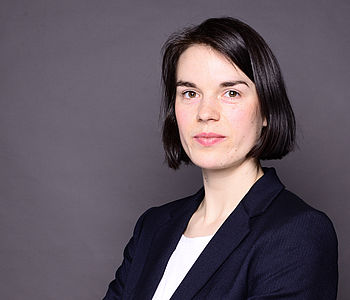Paula Seidel | Assoziierte Doktorandin

Mutterinstitut
:
Europa-Universität Viadrina Frankfurt (Oder)
|
Position
:
Assoziierte Doktorandin
|
Fachbereich
:
Geschichte
|
Biographie
Paula Seidel ist Doktorandin der Europa-Universität Viadrina und seit Juni 2019 wissenschaftliche Mitarbeiterin am Centre Marc Bloch (seit Herbst 2022 assoziiertes Mitglied). Sie studierte Interkulturelle Europastudien und Geschichte an der Martin-Luther-Universität Halle-Wittenberg. Mit der Wahl der regionalen Schwerpunkte Frankreich und Südosteuropa verfolgte sie ihr Interesse an transnationalen Ansätzen kulturhistorischer Forschung. Dieses vertiefte sie im Masterstudium der Europäischen Kulturgeschichte an der Europa-Universität Viadrina Frankfurt (Oder) in der Auseinandersetzung mit den grenzüberschreitenden Biografien und Diskursen europäischer Intellektueller. Zwei Studiensemester verbrachte sie an den Universitäten Caen und Zagreb. Derzeit (von September 2023 bis Februar 2024) ist Paula Seidel Stipendiatin am Leibnitz-Institut für Europäische Geschichte in Mainz.
Während des Masterstudiums war Paula Seidel als wissenschaftliche Hilfskraft am Lehrstuhl für Kulturgeschichte der Neuzeit bei Prof. Dr. Gangolf Hübinger tätig. Vor Promotionsbeginn leitete sie in Frankfurt (Oder) ein zweijähriges Projekt im Bereich der Regionalentwicklung (Bildungsübergänge).
Titel der Dissertation
Intellektuelle in Umbruchzeiten
Politische Gestaltungspraktiken des Publizisten Milan Ćurčin während des Zerfalls der Habsburgermonarchie und der europäischen Neuordnung nach dem Ersten Weltkrieg (1914-1929)
Zusammenfassung der Dissertation
Das Dissertationsprojekt erforscht politische Gestaltungspraktiken von Intellektuellen vor dem Hintergrund der krisenhaften Zeit des Ersten Weltkrieges und der europäischen Neuordnung. Im Zentrum stehen die Aktivitäten des serbischen Publizisten Milan Ćurčin sowie sein Netzwerk in Zagreb, Belgrad, Wien und London im Zeitraum von 1914-1929. Ćurčin setzte sich im Londoner Exil für die Gründung eines jugoslawischen Staates ein. Nach dessen Proklamation kämpfte er als Herausgeber der Zeitschrift „Nova Evropa“ für eine liberal-demokratische Staatsordnung.
Am biografischen Beispiel untersucht die Dissertation, wie Intellektuelle ihre Ordnungsideen auf konkreter Handlungsebene umsetzen. Sie fragt nach dem Zusammenspiel von Zeitdiagnosen, individuellem Gestaltungsanspruch und Gestaltungspraktiken. Dabei bezieht sie Ćurčins persönliches Netzwerk als Instrument politischer Mitgestaltung sowie als Kommunikationsraum ein. Anhand seiner Erfolge und Misserfolge, seiner Strategien und Anpassungen bilanziert das Forschungsprojekt über Räume und Grenzen politischer Mitgestaltung von Intellektuellen in postimperialen Umbruchzeiten.
Institution der Dissertation
Betreuer
Intellectuals in times of radical change Political Practices of the publicist Milan Ćurčin during the disintegration of the Habsburg Empire and the reorganisation of Europe after World War I (1914-1929)
Yugoslavia first existed as vision. South Slav intellectuals on the Balkans shared the idea of a common state uniting people with a common language. But what did they do to turn their vision into reality? How did they intervene in times of radical change, which opened up the political horizon/a space for the creation of new order?
The thesis deals with this question against the background of the First World War and the formation of a new European Order. The focus lies on the political activities of the Serbian publicist Milan Ćurčin (1880-1960) in the period between 1914 and 1929. During his exile in London he promoted the independence of the Southern Slavs from the Habsburg monarchy. After Yugoslavia became reality with the foundation of the Kingdom of Serbs, Croats and Slovenes, Ćurčin published the political and cultural magazine "Nova Evropa" [New Europe] in Zagreb and fought for a liberal democratic state order. In the role of an intellectual he analysed his present and attempted to shape a Yugoslav state. The paper considers his political activities, taking into account his personal network in Zagreb, Belgrade, Vienna and London. In his profession as well as in private life Ćurčin was a networker, sharing information and connecting players in the fields of science, art, politics and journalism. Analysing his letter correspondences, publications as well as institutional documents the project therefore shows individual action following the idea of Yugoslavism within a transnational networks of European intellectuals. Viewing strategies of action and adaptation, success and failure it concludes about spaces and limits for political action and contributes to the understanding of intellectual's agency in times of radical change.
Publikationen
Seidel, Paula (2023). Transnationale Allianzen und Ethnisierung für die Anerkennung Jugoslawiens: Nationale Konstruktionen eines Autorenkollektivs um den Publizisten Milan Ćurčin (1919). Zeitschrift für Migrationsforschung, 3(1), 97 - 121.